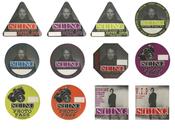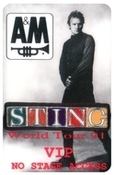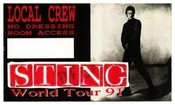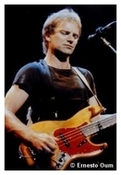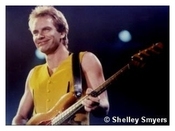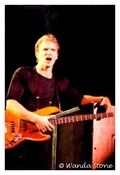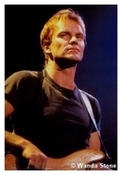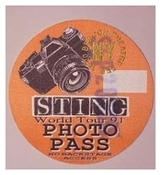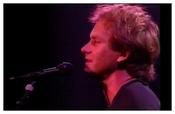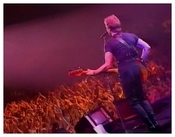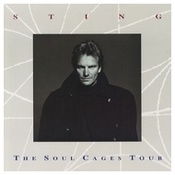
Soul Cages
Mar
1
1991
Chapel Hill, NC, US
Dean Smith Centerwith Concrete Blonde, Vinx
Perfect pace keeps Sting in full swing...
Whether the fans packing the Smith Center had come to experience Sting in the obligatory concert to support his new album or were hoping for a Police retrospective, the point is moot. They got plenty of both.
'The Soul Cages', his new A&M Records release, represents Sting's unshackling of a three-year writer's block, caused in part, he says, by his failure to deal with the death of his father in 1987. But by immersing himself in childhood memories and honing storytelling skills learned from Brazil's Kaiapo Indians during his work with the Rainforest Foundation, he finally broke through. So it can be argued that the current tour is a celebratory affair, and Friday's concert sure felt like it.
This was essentially the same Sting who hosted NBC's 'Saturday Night Live' in January. Clad in black, from T-shirt, jeans, boots and even fretless black bass, the 39-year-old native of Newcastle, England, appeared anything but brooding.
The crowd was his from the moment he took the stage, and he wasted no time getting to the new material, kicking off with 'All This Time', the first single from 'The Soul Cages'. Dispensing with the oboe, saxophone and Northumbrian pipes that colored the studio effort, his tight four-piece band locked into a rock-jazz groove and didn't relinquish it all evening.
Stripped of excess instrumentation, the songs from 'The Soul Cages' were more immediate. Sting, whose lyrics at times seem deliberately ambiguous, displayed a sense of humor that belies the seriousness of his image. For a little ice-breaker, he served up a quick cup of tea (in the Smith Center, not the Sahara) to make himself feel at home. And between numbers he challenged different sections of the arena to a hooting contest.
''We're playing South Carolina tomorrow night,'' he told them. ''You don't want them to be louder than you are, right?'' And for a little extra flash, there was some righteous hip-shaking (feminine squeals noted) during 'When the World is Running Down, You Make the Best of What's Still Around'.
Through it all, Sting pumped away on his bass with two-handed fury, turning at times to face his mates in virtuosic rapture. David Sancious soared on keyboards. Dominic Miller recalled former Police guitarist Andy Summers on some cuts and staked out new territory on others. And Vince Colaiuta tempered the rhythm with timepiece precision. Arguably it's Sting's best unit ever.
The material was evenly distributed, with six cuts from 'The Soul Cages' and other numbers from his Police and solo repertoire. He baited the crowd, calling for requests and got several. 'Roxanne' was at the top of the list, and with it he launched into a series of Police hits, including 'Bring on the Night' and 'King of Pain'.
Wrapping up the night was an incendiary version of Jimi Hendrix's 'Purple Haze', followed by 'If You Love Somebody Set Them Free' seguing into the seductively malevolent 'Every Breath You Take'.
For the encore, he exchanged bass for acoustic guitar and delivered the hauntingly delicate 'Fragile' from '...Nothing Like the Sun'. The perfect coda to a concert flawlessly paced and executed.
Concrete Blonde, an L.A. threesome, opened with a punchy if muddy set. Former Roxy Music drummer Paul Thompson's bass thumps echoed like cannon shots. Surprisingsly, singer/bassist Johnette Napolitano was most effective on the acoustic 'Wendy'. James Mankey's guitar seemed lost in cavernous mix. Percussionist Vinx, sort of a stand-up with a conga drum, worked the crowd for the main attraction. Then Sting took the stage and the thunder came down.
(c) The Raleigh News & Observer by Chuck Waters
Sting still intimate playing to thousands...
Sting is one of the most cerebral figures on the rock scene.
His success offers encouraging evidence that there's still room for intellect in pop music. He values the subtlety of musical expression and rarely panders to his audience, although he's capable of writing a hit almost at will.
His new album, 'The Soul Cages', is a brave and introspective look into the self, triggered by the death of his parents.
A comfortably packed house at the Dean E. Smith Center welcomed Sting with open arms Friday night. His music received a hearty, visceral response from 10,525 fans, who leaped to their feet from the opening number. The fans seemed willing and eager to sway along to anything that contained a semblance of a beat. Sting played nearly every song from 'The Soul Cages', wrapping blocks of material from that album around what amounted to a run-through of greatest hits by his old band, the Police, a segment occupied the middle portion of his two-hour show.
He seems to have made peace with his past as a Police man; earlier solo tours found him avoiding their repertoire almost entirely. In any event, the crowd was plenty tickled to hear the choppy chords and reggae beat of 'Roxanne', which has long since passed into the realm of rock standard. He also offered 'King of Pain', 'Message in a Bottle' and, as a climactic finale, 'Every Breath You Take'. During the show, Sting also worked in two cover songs: Bill Withers' 'Ain't No Sunshine' and Jimi Hendrix's 'Purple Haze'.
The former seemed designed to let keyboardist David Sancious take a long solo turn. 'Purple Haze', on the other hand, came off kind of silly and completely removed from Sting's suave, unruffled persona. Why bother?
The last time he played Chapel Hill, Sting had a quasi-jazz band in tow, with saxophonist Branford Marsalis as the instrumental centerpiece. There are no real jazzers in the current touring band, however. Sting fronted a small combo, playing bass himself and being joined by Sancious, a guitarist and drummer.
Maybe economics has something to do with the reduced scale, but it all worked to the good, as the playing was clean and uncluttered. There were few pyrotechnic peaks of the kind rock fans are accustomed to witnessing in the course of a concert.
Most everything along that line belonged to the opening band, Concrete Blonde, which played a well-received set. Instead, Sting's ensemble chugged along at a polite, musicianly simmer. Most of the time, it suited the calm, collected temperament of his music. On occasion, though, it skirted boredom, becoming almost too genteel and aloof for its own good.
Still, Sting communicated the emotional essence of his new album without resorting to stagy gimmickry, and the audience was willing to give him the latitude to express himself. The effect was particularly stunning on 'The Wild, Wild Sea', which gradually built over about ten minutes to a crescendo that sounded and felt like a storm at sea.
Music this intimate rarely works in arenas; Sting proved to be the exception to the rule.
(c) The Greensboro News & Record by Parke Puterbaugh
Whether the fans packing the Smith Center had come to experience Sting in the obligatory concert to support his new album or were hoping for a Police retrospective, the point is moot. They got plenty of both.
'The Soul Cages', his new A&M Records release, represents Sting's unshackling of a three-year writer's block, caused in part, he says, by his failure to deal with the death of his father in 1987. But by immersing himself in childhood memories and honing storytelling skills learned from Brazil's Kaiapo Indians during his work with the Rainforest Foundation, he finally broke through. So it can be argued that the current tour is a celebratory affair, and Friday's concert sure felt like it.
This was essentially the same Sting who hosted NBC's 'Saturday Night Live' in January. Clad in black, from T-shirt, jeans, boots and even fretless black bass, the 39-year-old native of Newcastle, England, appeared anything but brooding.
The crowd was his from the moment he took the stage, and he wasted no time getting to the new material, kicking off with 'All This Time', the first single from 'The Soul Cages'. Dispensing with the oboe, saxophone and Northumbrian pipes that colored the studio effort, his tight four-piece band locked into a rock-jazz groove and didn't relinquish it all evening.
Stripped of excess instrumentation, the songs from 'The Soul Cages' were more immediate. Sting, whose lyrics at times seem deliberately ambiguous, displayed a sense of humor that belies the seriousness of his image. For a little ice-breaker, he served up a quick cup of tea (in the Smith Center, not the Sahara) to make himself feel at home. And between numbers he challenged different sections of the arena to a hooting contest.
''We're playing South Carolina tomorrow night,'' he told them. ''You don't want them to be louder than you are, right?'' And for a little extra flash, there was some righteous hip-shaking (feminine squeals noted) during 'When the World is Running Down, You Make the Best of What's Still Around'.
Through it all, Sting pumped away on his bass with two-handed fury, turning at times to face his mates in virtuosic rapture. David Sancious soared on keyboards. Dominic Miller recalled former Police guitarist Andy Summers on some cuts and staked out new territory on others. And Vince Colaiuta tempered the rhythm with timepiece precision. Arguably it's Sting's best unit ever.
The material was evenly distributed, with six cuts from 'The Soul Cages' and other numbers from his Police and solo repertoire. He baited the crowd, calling for requests and got several. 'Roxanne' was at the top of the list, and with it he launched into a series of Police hits, including 'Bring on the Night' and 'King of Pain'.
Wrapping up the night was an incendiary version of Jimi Hendrix's 'Purple Haze', followed by 'If You Love Somebody Set Them Free' seguing into the seductively malevolent 'Every Breath You Take'.
For the encore, he exchanged bass for acoustic guitar and delivered the hauntingly delicate 'Fragile' from '...Nothing Like the Sun'. The perfect coda to a concert flawlessly paced and executed.
Concrete Blonde, an L.A. threesome, opened with a punchy if muddy set. Former Roxy Music drummer Paul Thompson's bass thumps echoed like cannon shots. Surprisingsly, singer/bassist Johnette Napolitano was most effective on the acoustic 'Wendy'. James Mankey's guitar seemed lost in cavernous mix. Percussionist Vinx, sort of a stand-up with a conga drum, worked the crowd for the main attraction. Then Sting took the stage and the thunder came down.
(c) The Raleigh News & Observer by Chuck Waters
Sting still intimate playing to thousands...
Sting is one of the most cerebral figures on the rock scene.
His success offers encouraging evidence that there's still room for intellect in pop music. He values the subtlety of musical expression and rarely panders to his audience, although he's capable of writing a hit almost at will.
His new album, 'The Soul Cages', is a brave and introspective look into the self, triggered by the death of his parents.
A comfortably packed house at the Dean E. Smith Center welcomed Sting with open arms Friday night. His music received a hearty, visceral response from 10,525 fans, who leaped to their feet from the opening number. The fans seemed willing and eager to sway along to anything that contained a semblance of a beat. Sting played nearly every song from 'The Soul Cages', wrapping blocks of material from that album around what amounted to a run-through of greatest hits by his old band, the Police, a segment occupied the middle portion of his two-hour show.
He seems to have made peace with his past as a Police man; earlier solo tours found him avoiding their repertoire almost entirely. In any event, the crowd was plenty tickled to hear the choppy chords and reggae beat of 'Roxanne', which has long since passed into the realm of rock standard. He also offered 'King of Pain', 'Message in a Bottle' and, as a climactic finale, 'Every Breath You Take'. During the show, Sting also worked in two cover songs: Bill Withers' 'Ain't No Sunshine' and Jimi Hendrix's 'Purple Haze'.
The former seemed designed to let keyboardist David Sancious take a long solo turn. 'Purple Haze', on the other hand, came off kind of silly and completely removed from Sting's suave, unruffled persona. Why bother?
The last time he played Chapel Hill, Sting had a quasi-jazz band in tow, with saxophonist Branford Marsalis as the instrumental centerpiece. There are no real jazzers in the current touring band, however. Sting fronted a small combo, playing bass himself and being joined by Sancious, a guitarist and drummer.
Maybe economics has something to do with the reduced scale, but it all worked to the good, as the playing was clean and uncluttered. There were few pyrotechnic peaks of the kind rock fans are accustomed to witnessing in the course of a concert.
Most everything along that line belonged to the opening band, Concrete Blonde, which played a well-received set. Instead, Sting's ensemble chugged along at a polite, musicianly simmer. Most of the time, it suited the calm, collected temperament of his music. On occasion, though, it skirted boredom, becoming almost too genteel and aloof for its own good.
Still, Sting communicated the emotional essence of his new album without resorting to stagy gimmickry, and the audience was willing to give him the latitude to express himself. The effect was particularly stunning on 'The Wild, Wild Sea', which gradually built over about ten minutes to a crescendo that sounded and felt like a storm at sea.
Music this intimate rarely works in arenas; Sting proved to be the exception to the rule.
(c) The Greensboro News & Record by Parke Puterbaugh

